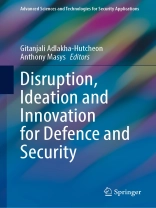This book explores types of disruptions in defence and security, ways to assess disruptions triggered by technological advancements or the lack of legal frameworks; the consequent delays or disruptions to making decisions, creative idea generation and finally the innovative pathways to counter such disruptions. What do disruption, ideation and innovation have in common? How do disruptions, ideas and innovation coexist within defence and security? They all influence and impact decision-making. Disruptions drive decision-making. Ideation raises solutions to resolve the disruptions and innovation brings ideas into life. While disruptions may be common place in the business world, where disruptive technologies displace pre-existing ones; they are less prevalent in defence, even less so within the realm of security. For the last 10 years, there has been talk of disruptive technologies and even adoption of terms such as emerging and disruptive technologies by the largest military alliance—NATO, yet the means to assess these remain elusive. It offers researchers opportunities to assess different types of disruptions, ideate and innovate on scientific grounds to counter disruptions, thereby bolstering the defence and security community’s ability to make decisions better.
Cuprins
1. Understanding the landscape of disruption, ideation and innovation.- 2. System reliability: A Cold War lesson.- 3. Quantum Computing: Unraveling the Hype.- 4. Emerging and disruptive technologies and security: Considering trade-offs between new values and emerging risks.- 5. Human Systems Exploration for Disruption, Ideation and Innovation in Defence and Security Systems.- 6. Total War: A Context for Cybersecurity Innovation.- 7. The impact of the Internet and cyberspace on the Rise in Terrorist Attacks across the US and Europe.- 8. Shocks and Disruptions in Defence and Security: How to lead by Inspiring Innovation and Ideation.- 9. Health security and malaria: a neural network i OS intelligent platform for implementing Seek and Destroy Integrated Vector Management (IVM) policies.- 10. Convergence.- 11. Legal principles governing disruptive technologies in policing: legal innovations?.- 12. Being two steps ahead: the added value of anticipatory intelligence analysis in law
enforcement.- 13. Fifth generation Warfare? Violent transnational social movements as security disruptions.
Despre autor
Dr Anthony Masys is Associate Professor, Strategic Area Lead for Interdisciplinary Science and Practice and Director of Global Disaster Management, Humanitarian Assistance and Homeland Security. A former senior Air Force Officer, he has a B.Sc. in Physics and M.Sc. in Underwater Acoustics and Oceanography from the Royal Military College of Canada and a Ph.D. from the University of Leicester. He is Editor in Chief for Springer Publishing book series: Advanced Sciences and Technologies for Security Applications and holds various advisory board positions with academic journals and books series. He is an internationally recognized author, speaker and facilitator and has held workshops on security, visual thinking, design thinking and systems thinking in Europe, Canada, South America, West Africa and Asia. He has published extensively in the domains of physics and the social sciences. His recent books include:
· Opening the Black Box of Human Error
· Networks and Network Analysis for Defence and Security. Springer Publishing
· Disaster Management- Enabling Resilience. Springer Publishing
· Applications of Systems Thinking and Soft Operations Research for managing complexity. Springer Publishing
· Exploring the Security Landscape- non-traditional security challenges. Springer Publishing.
· Disaster Forensics: understanding root cause and complexity causality. Springer Publishing
· Asia/Pacific Security challenges: managing black swans and persistent threats. Springer Publishing
· Security by Design
· Global Health Security
Dr Gitanjali Adlakha-Hutcheon is Defence Scientist in the Department of National Defence in Canada. Dr Gitanjali Adlakha-Hutcheon has a B.Sc. in Chemistry, Botany and Zoology and M.Sc. in Biochemistry and Microbiology and a Ph.D. in Pharmacology and Therapeutics from the University of British Columbia in Canada. She has conducted research on disruptions for over a decade, within, and for Canada at international fora including NATO and the Canadian, The Netherlands and Sweden Trilateral memorandum of understanding. She is an internationally recognized speaker and a well-published author. She has delivered over a 100 presentations at various conferences and has published over 25 peer-reviewed papers in the field of foresight and disruptions. Her research focuses on the identification of means to assess disruptions, and how these can aid planning for defence.












